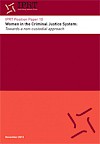IPRT Position Paper 10: Women in the Criminal Justice System
5th December 2013
 The IPRT Position Paper 10: Women in the Criminal Justice System - Towards a non-custodial approach includes an account of recent trends in the imprisonment of women in Ireland. It goes on to look at the complex range of needs experienced by many women convicted of an offence and the associated overuse of remand for women offenders.
The IPRT Position Paper 10: Women in the Criminal Justice System - Towards a non-custodial approach includes an account of recent trends in the imprisonment of women in Ireland. It goes on to look at the complex range of needs experienced by many women convicted of an offence and the associated overuse of remand for women offenders.
It then discusses the issues faced by women in prison who have caring responsibilities, followed by a section on challenges faced by women leaving prison.
The next section details developments in the UK and prison standards that reflect an increasing acknowledgement of the value of a community-based approach to dealing with women offenders.
This is followed by an overview of some emerging models of good practice, followed by conclusions and two key recommendations.
Download the Position Paper here.
Key Messages
- The number and proportion of women in the Irish prison population has increased significantly in recent years. Most women are committed to prison for non-violent offences, such as non-payment of fines. Consequences have included overcrowding in women’s prisons and an overuse of temporary release.
- Women offenders tend to come from a background of social disadvantage and poverty, and often suffer from mental health problems, substance dependency, accommodation problems and poor family relationships. These issues can make it difficult for women to adhere to bail conditions, which has led to an overuse of remand for women offenders. This in turn has negative implications for children of women who are imprisoned on remand and the employment prospects of these women.
- A high proportion of women in prison have children. Women also play an important role in caring for dependent relatives. Women who are imprisoned can no longer fulfil their caring responsibilities and the consequences of this can be significant. This is particularly an issue for mothers with babies, due to the absence of a mother and baby unit in either female prison in Ireland.
- Women face a range of problems on being released from prison, relating to housing, accommodation and stability, and over half of women prisoners reoffend.
- Developments in the UK have reflected a growing acknowledgement of the value of non-custodial alternatives and community-based supports for women offenders. This has also been highlighted by the UN, in the ‘Bangkok Rules’, which have informed the Irish Inspector of Prisons on the subject of women prisoners.
- The ‘one-stop-shop’ approach to supporting women offenders in the community takes a holistic approach, with a range of supports and services provided in one location. A number of centres in the UK are based on this promising model. In Ireland, the Tus Nua project provides supported housing and other supports to women leaving the Dóchas Centre.
- This position paper makes two key recommendations: that a non-custodial approach should be adopted for women offenders; and in the few cases where prison is necessary, the negative impact of imprisonment on the women and those they care for should be minimised.




